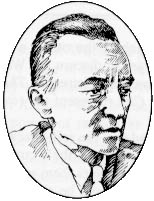
1928 – 1985
“Can the pope speak infallibly?”, Stringfellow was asked at an ecumenical gathering. He reply was swift and sure. “Any Christian who speaks in conformity to the gospel speaks infallibly.” It was typical of the pithy pronouncements which would endear him to many. Yet he was ever as profound as he was precise. When Karl Barth visited the United States in 1962 he pointed past the seminary professors to the diminutive lawyer and remarked, “This is the man America should be listening to.”
William Stringfellow was born in Johnston, Rhode Island. His father was a knitter in a stocking factory. Needing money for a university education, he held three jobs in his last year of high school, yet managed to gain several scholarships and find himself at Bates College by age fifteen. Another scholarship took him to the London School of Economics. It was here, he was to write later, that he learned the difference between vocation and career. Military service followed with the Second Armored Division of the U.S. Army. When other soldiers complained that they were deprived of an identity in the armed forces and couldn’t “be themselves”, he disagreed. He knew that it is the living Word of God, Jesus Christ, which gives us our identity and frees us to “own” ourselves, cherish ourselves, profoundly be ourselves, anywhere.
Next was Harvard Law School. While a degree from this prestigious institution was a key which unlocked many doors, the door on which he knocked belonged to a slum tenement in Harlem, New York City. He had decided to work among poor blacks and Hispanics, the most marginalized of the metropolis. The move from Harvard to Harlem was jarring. His apartment measured twenty-five feet by twelve feet. Earlier five children and three adults had lived in it. The kitchen contained a tiny sink and an old refrigerator (neither of which worked), an old gas stove, a bathtub, and a seatless toilet bowl. Thousands of cockroaches were on hand to greet him. “Then I remembered that this is the sort of place in which most people live, in most of the world, for most of the time. Then I was home.”
Stringfellow’s chief legal interests pertained to constitutional law and due process. Both were dealt with every day as he represented victimized tenants, accused persons who would otherwise have inadequate counsel in the courts, and impoverished black people who were shut out of public services like hospitals and government offices. Knowing that his Lord had touched the untouchable — lepers — he represented those who belonged to the George Henry Foundation, sex-offenders whom no other lawyer would assist.
Throughout his student days Stringfellow had involved himself in the World Christian Student Federation. Now he was as deeply immersed in the World Council of Churches, not to mention the turbulence of his own denomination, The Episcopal (Anglican) Church of the U.S. Friends insist he was never more eloquent than the night he stood up, uninvited, in the Anglican Cathedral, Washington, and pleaded with his denomination to ordain women to the priesthood. He appeared not to be heard.
Frustration with the church was not new to him. Upon moving to Harlem he had joined the East Harlem Protestant Parish, enthused by its stated commitment to honouring the witness of scripture and the vocation of the laity. Within fifteen months he sadly concluded that once again the bible had been silenced and the laity submerged. The Parish, like most churches in North America, was a clergy-controlled preserve of shallow leftist ideology. Meanwhile, denominational authorities refused to use the confirmation class book he had been commissioned to write. (The realism of Instead of Death was too startling!)
His beloved poor in Harlem continued to mirror to him the engagement of the Word of God with human anguish. “What sophisticates the suffering of the poor”, he wrote, “is the lucidity, the straightforwardness with which it bespeaks the power and presence of death among men in the world.” All men and women. He had learned from scripture that apart from the resurrected One death is the ruling power of this world, corrupting and crumbling everything its icy breath corrodes. “And from this power of death no man may deliver his brother, nor may a man deliver himself.”
His frustration with seminaries was inconsolable. Liberal schools of theology, having disdained the bible, offered little more than “poetic recitations…social analysis, gimmicks, solicitations, sentimentalities, and corn.” Fundamentalist institutions, on the other hand, had yet to learn that “…if they actually took the bible seriously they would inevitably love the world more readily…because the Word of God is free and active in the world.” As often as seminarians shunned him, students at the law schools and business schools of major American universities heard him eagerly: they were aware that he knew just how the world turns, and who or what makes it turn. So it was that he travelled easily among practising law in behalf of those who could not afford to pay, delivering a guest lecture at Columbia University Law School, preaching the good news of deliverance and reconciliation among church people across America who had no grasp of the deadly, deep-dyed racism he lived with every day. Fourteen books poured from his pen, as well as dozens of articles in both theology and law.
Raging diabetes overtook him. When he died a distraught Daniel Berrigan, Jesuit anti-nuclear protester whom Stringfellow had afforded sanctuary, could only say, “He kept the Word of God so close…and in such wise that its keeping became his own word and its keeping.” Jim Wallis, leader of the Sojourners Community in Washington where Stringfellow had spoken frequently, summarized the lawyer’s life: “In his vocation and by his example he opened up to us the Word of God.”
Victor A. Shepherd
February 1992
(Illustration by Marta Lynne Scythes)